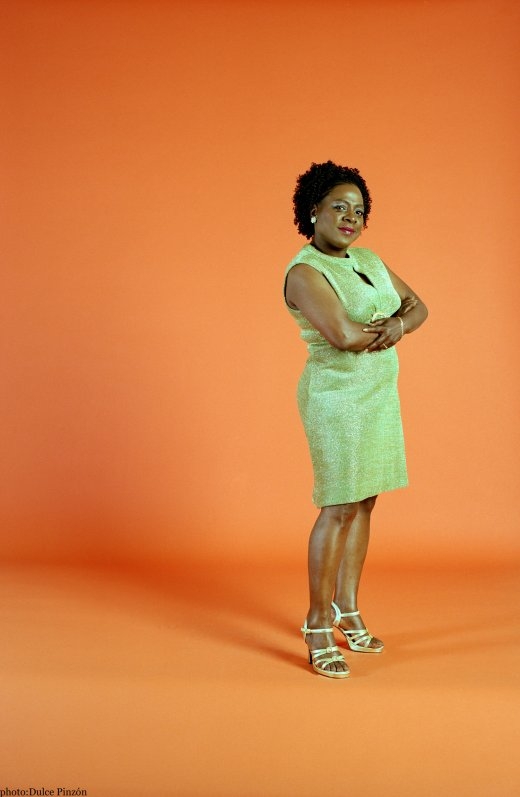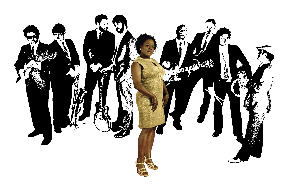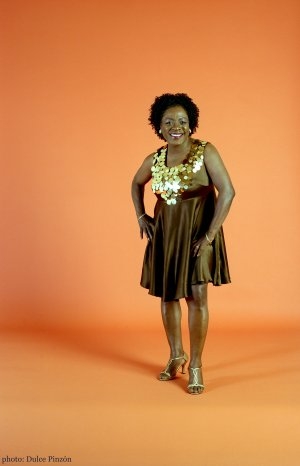
EDITOR’S NOTE: To mark the sad and tragically premature passing of Sharon Jones we present this reprise edition of our 2011 Q&A with her. Good night, Miss Jones wherever you are.
![]() BY JONATHAN VALANIA The first time Sharon Jones & the Dap Kings came to town, back in January of ’08, there was a prevailing giddiness in the air at the TLA, a palpable sense that we were lucky enough to attend a very auspicious occasion, above and beyond the usual concert experience. A sense that we were all active participants in poetic justice, and by ponying up for a ticket and selling out the joint, a long-neglected talent was getting her turn in the sun. As Sharon Jones would be the first to tell you, record executives have long told her that despite having pipes of gold, she was too short, too wide, and, come the ripe old age of 25, too old to fit the Whitney Houston cookie cutter, and thus consigned her to the B-list exile of part time jobs and night club gigs, through which she gamely trudged yeoman-like for years. Until now. The now being two years after Amy Winehouse made the world safe for gutsy, take-me-as-I-am retro-soul with her break out hit, “Rehab”, from the Grammy-nominated Back To Black — for which she employed Sharon Jones’ backing band, The Dap Kings. Some have gone so far as to suggest that Amy Winehouse is the new Pat Boone — a blander, whiter face put on something considered too raw and black for white audiences to embrace en masse.
BY JONATHAN VALANIA The first time Sharon Jones & the Dap Kings came to town, back in January of ’08, there was a prevailing giddiness in the air at the TLA, a palpable sense that we were lucky enough to attend a very auspicious occasion, above and beyond the usual concert experience. A sense that we were all active participants in poetic justice, and by ponying up for a ticket and selling out the joint, a long-neglected talent was getting her turn in the sun. As Sharon Jones would be the first to tell you, record executives have long told her that despite having pipes of gold, she was too short, too wide, and, come the ripe old age of 25, too old to fit the Whitney Houston cookie cutter, and thus consigned her to the B-list exile of part time jobs and night club gigs, through which she gamely trudged yeoman-like for years. Until now. The now being two years after Amy Winehouse made the world safe for gutsy, take-me-as-I-am retro-soul with her break out hit, “Rehab”, from the Grammy-nominated Back To Black — for which she employed Sharon Jones’ backing band, The Dap Kings. Some have gone so far as to suggest that Amy Winehouse is the new Pat Boone — a blander, whiter face put on something considered too raw and black for white audiences to embrace en masse.
The only problem with that Internet meme is that — setting aside for second that Winehouse is exotic enough in appearance to be of indeterminate race to the casual observer — it completely ignores the charismatic power of the writing on Back To Black. “Rehab” is one of those songs that rings everyone’s bell. Song like that don’t come around often, and no matter what she puts up her nose or bang into her arms — annotated daily in the British tabloids in excruciating photographic detail — it does not change the fundamental fact: she rang the bell.
Nothing on Sharon Jones & The Dap Kings’ splendid 100 Days, 100 Nights quite manages that nearly impossible feat — despite Jones’ gutbucket authenticity and the Dap Kings’ evanescent hints of the Booker T’s MG’s, Smokey Robinson’s Miracles, James Brown Fabulous Flames and Otis Redding at his most bittersweet. All of which  were on display that night at TLA. Jones was regal and fierce, truly a force to be reckoned with, literally shining like a diamond in her sparkly vintage dress. The eight-piece Dap Kings lived up to their name, each sporting a stylish vintage suit and never once stepping out of the pocket — not when they played it nice and easy, nor when they played it nice and rough, as Tina Turner used to say.
were on display that night at TLA. Jones was regal and fierce, truly a force to be reckoned with, literally shining like a diamond in her sparkly vintage dress. The eight-piece Dap Kings lived up to their name, each sporting a stylish vintage suit and never once stepping out of the pocket — not when they played it nice and easy, nor when they played it nice and rough, as Tina Turner used to say.
Hard to split the exact difference between soul and funk — and for that matter the blues — without somebody getting their feelings hurt. Except to say that with funk, much like disco, it does require a certain degree of knowing the right moves and wearing the right clothes. With soul, I suppose, its universal and, I suspect, eternal appeal will be that it only asks that you have one — a soul, that is, and when an act like Sharon Jones and the Dap Kings fire it up, you respond in kind simply because you are alive, and as such you invariably hurt, because everybody hurts. That’s the blues. But tonight, you are here, and I am here, and we are all together. And that is worth celebrating — righteously so — because for this brief and shining moment, nothing can hurt us. That’s what soul music is. Either that or, gospel music wearing sexy underwear under its robes. Fortunately we just happen to have Sharon Jones on the phone, so let’s ask her…
PHAWKER: I’m curious what your personal definition of soul music is?
SHARON JONES: My personal definition of soul music is music that you feel in the heart, in the soul. It has nothing to do with color. Music that really gets in there so that people can groove with it, love it, and enjoy it. Soul music is like the roots, it started from the time of slavery when people were humming, or doing things to keep their mind off the pain of what they were going through. That went on and eventually became blues and evolved into gospel singing. That’s were all this originated, inside the heart.
PHAWKER: I’m fascinated by this stint that you had as a prison guard. How long did that last?
SHARON JONES: Only two years, it didn’t last long. It went from ’88 to ’90, and believe it or not out of those two years, nine of those months I hurt myself so I went out on leave. The job wasn’t meant for me since it took  me away from my singing. It was fun, but they told me they owned me. Nobody owned me. I resigned. When I went in, the little box they had me in had bars. I was sitting there, looking through bars like I was a prisoner.
me away from my singing. It was fun, but they told me they owned me. Nobody owned me. I resigned. When I went in, the little box they had me in had bars. I was sitting there, looking through bars like I was a prisoner.
PHAWKER: What was the worst day on that job, the worst thing you ever saw?
SHARON JONES: Where I worked, it was like the equivalent of the adolescents. It was like a gang, and I was right there in it. To me, that was worse than the rest was when they put us in with the [adult] men. I watch these inmates, they don’t say anything, and you’re so afraid how they have so much control that they can come in here and beat up people and take people’s stuff. I watched some kid get his eye knocked out, and when they asked who did it, he was silent. That was really sad. They need to get over that code that they have in prison, because that makes us really helpless.
PHAWKER: So the good news is that these days you make your living as a singer, correct?
SHARON JONES: Yep, this is it now. For 13 years I’ve been trying to make myself a musician, but in the last five years, we’ve been seeing some progress. I think last year was the best year we’ve had in the last 13 years we’ve been working
PHAWKER: Lemme ask you, are you able to pay for health insurance?
SHARON JONES: You know what, that is what right now my manager is working on. She’s filling out the papers for us to sign for our insurance.
PHAWKER: That’s awesome. So you and everyone in the Dap-Kings will have health insurance. Can I ask how old are you now?
old are you now?
SHARON JONES: As of May 3rd next Monday, I’ll be 53.
PHAWKER: Awesome, congratulations and happy birthday in advance. I’m curious, I know that you’ve been told over the years by record people to lose weight or, somebody actually told you that your skin was too dark, and you needed to lighten it? Is that even possible?
SHARON JONES: Back in the day, in the 70’s, they had this dream that dark skinned women could always bleach their skin out. A lot of women were using that stuff. I never had any use for that though. I’m dark skinned, and that’s just it.
PHAWKER: I was just wondering what you think of the whole Susan Boyle controversy?
SHARON JONES: Oh, I’m grateful for the Internet, and people can reach out more now. If you turn on your TV, do you see me on MTV? You don’t hear them playing us on the mainstream radio, but thank god that people hear good stuff and they appreciate it. The major record labels put out there what they want the people to hear. I think Susan, she has a great voice, and that’s all that matters. That’s the image people should be looking at.Flava Flav, he’s not so great to look at, but he’s a nice guy and he has talent. I met him in Australia, Flava Flav and Chuck D. Out of all the rappers, they treated me with so much respect.
PHAWKER: Are there any other big names that are planning to come in as guests on the next record?
SHARON JONES: No, I think we’re saving the potential big names for a gospel record.
PHAWKER: Oh, you’re going to do a gospel record?
SHARON JONES: Oh sure. We do what we want to, that’s our record label.
PHAWKER: Well, what comes first, a Dap-Kings record?
SHARON JONES: Oh, definitely we have to do that. My album will probably be something me and [my producer] will be working on. Of course, your going to get the musicians involved in it, but I just have to pick some songs I want to do. I like the old gospel stuff. I don’t now what to do with it yet, but when the time comes, God will lead me the right way, and that’s how it’s been all my life. I don’t think he gave me this gift for me to not be able to share it. It took me till 40 to start making it, to make my first major album.
PHAWKER: Jumping onto the next topic, Lou Reed originally asked you to be the backup singer for the live version of Berlin that he was planning, but you had to drop out of that because you also had a small role in The Debaters with Denzel Washington?
SHARON JONES: That’s what I had to do, and I felt so bad
PHAWKER: I heard that Lou got upset though, you went to talk to him and he ignored you?
 SHARON JONES: Well, here’s what happened. When we had to do a show together across the park, I was on the bill with him, and of course after this incident, I saw him, and I was like Yo! He kept walking away, and I ran after him. I was like “Lou, it’s Sharon”, and he was like “I know”. He kept walking away, and i put my arm around him and asked him to please not be mad at me. He turned to me and said “How could you screw me forDenzel “? I mean, I had my character, my name was Lila, I saw my name at the end credits. That was an experience I had to do. Afterwards, everything was fine, and we worked together again. I think I’ve seen Lou a couple times since that incident.
SHARON JONES: Well, here’s what happened. When we had to do a show together across the park, I was on the bill with him, and of course after this incident, I saw him, and I was like Yo! He kept walking away, and I ran after him. I was like “Lou, it’s Sharon”, and he was like “I know”. He kept walking away, and i put my arm around him and asked him to please not be mad at me. He turned to me and said “How could you screw me forDenzel “? I mean, I had my character, my name was Lila, I saw my name at the end credits. That was an experience I had to do. Afterwards, everything was fine, and we worked together again. I think I’ve seen Lou a couple times since that incident.
PHAWKER: Let me ask you a question about Amy Winehouse. I know you get asked this a lot, but basically, the perception is that because she’s a skinny white girl, she became the big superstar,basically by stealing Sharon Jones’ act, and even using Sharon Jones’ band. Meanwhile, Sharon Jones labors in relative obscurity. What do you think about that perception?
SHARON JONES: Well, people can have all perceptions about things. For me, I sort of felt a little left out. They can praise her, but they should’ve at least mentioned me. The Dap-Kings and I got a little mention, and people started listening and liking what we had. Once they started tuning into our label, they started hearing more. Look where she’s at. We’ve been out here 13 years. Anything that’s out past the 13 years, they started their own independent label, but they heard about us and we inspired them. i know the truth and where they’re coming from. People want me to say bad things about Amy, and I have nothing bad to say about her. Actually, my heart goes out to that child, I pray for her because she’s killing herself. I talk to her, and she’s living her life.
PHAWKER: You guys got along well? She treated you with respect?
SHARON JONES: Oh yes. I met her when I was in London. She was in a pretty bad state, and I was just like “Baby, what are you doing?” She knows me though
PHAWKER: She was kind of out of it?
SHARON JONES: Yeah, you know, she’d been partying. I don’t know what else she did though, I didn’t see  her do anything. She wanted to come to this shoot the next night, and me and her do something. I left them all hanging that night though, I had to get to bed.
her do anything. She wanted to come to this shoot the next night, and me and her do something. I left them all hanging that night though, I had to get to bed.
PHAWKER: I read somewhere that the Dap-Kings were offered to work with Bob Dylan?
SHARON JONES: Yeah. They did some stuff with Bob Dylan, a little video or song or something with him. It was rough, but they did something recently recorded with him, so they might want them to come back for more.
PHAWKER: So they did some recording or played with him?
SHARON JONES: I remember it was like a video in the street in Brooklyn, and the Dap-Kings were in that. The Dap-Kings have done stuff for Shakira, Queen Latifah, and Al Green with the horns section.
PHAWKER: I wanted to ask you about some of the nicknames of the Dap-Kings. The guitarist’s name is Binky Griptite. That is the most awesome nickname I’ve ever heard. Does his mom call him that?
SHARON JONES: I remember the day he came up with that name Binky Griptite, and we’ve been calling him that ever since.
PHAWKER: One last question, you’re coming to Philadelphia Wednesday. Do you have any thoughts about  Philly? Do you like playing here?
Philly? Do you like playing here?
SHARON JONES: Yeah, we’ve made some trips there, it’s not far and people come out.
PHAWKER: What’s the live show like? What can we expect?
SHARON JONES: Well we’re definitely working up a little storm. Just like everything else, it’ll be Grade-A.
